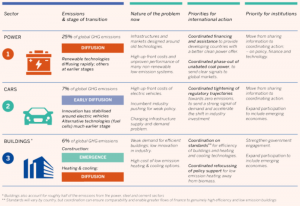by David Victor, via Energy Post

December’s COP25 in Madrid showed how difficult it is proving to get agreement between nations on how to ramp up the deep decarbonisation the world needs. David Victor at the University of California, San Diego, writing for Rocky Mountain Institute, accepts that international consensus is never going to be easy. Instead, he recommends that individual sectors take control of their destiny. His co-authored report “Accelerating The Low Carbon Transition” defines the top 10 emitting sectors as power, agriculture and land use, cars, trucks, shipping, aviation, buildings, steel, cement, and plastics. Within each sector a growing number of firms and sub-national actors are already showing leadership, often aided by governments at the national level. New innovations are emerging faster than governments can agree between themselves on how to use them. If the individual sectors move first and set the pace, governments will find it much easier to reach the international consensus that so far eludes them.
As the United Nations’ annual climate conference in Madrid (COP25) limped to a close, it has become clear that climate summits are stuck in a rut. The job of cutting global emissions is actually getting harder, and not just because the planet keeps warming. Like many of the people in the halls in Madrid, I have been working on the climate problem for 30 years. Over that diplomatic epoch, emissions have gone up.
There are lots of problems with how climate diplomacy is unfolding. Some are rooted in the unavoidable tension between negotiations that must be global in scope—so they are legitimate and account for all important voices—and the challenge of reaching agreement by consensus.